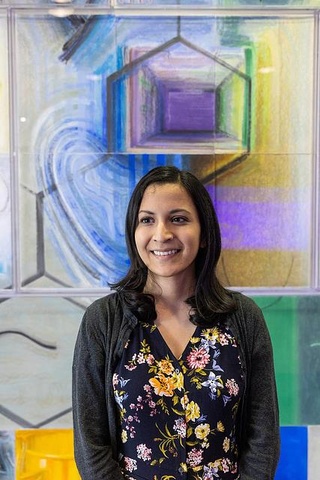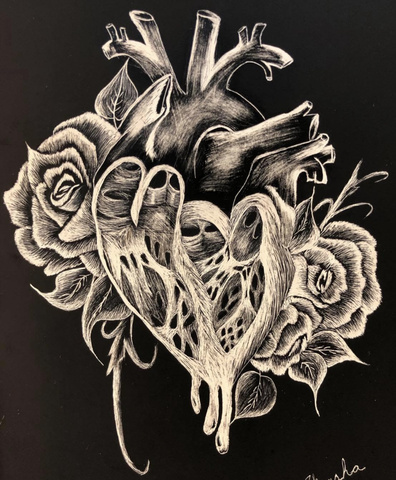
Undergrad: University of Pennsylvania
Matched: Internal Medicine, Washington University in St. Louis
What drew you to a career in medicine?
I knew in high school that I really liked my science classes, and I wanted to keep exploring career paths in science. I joined a research lab in undergrad where I looked at specific brain receptors to try to find different targets for people who struggle with being able to quit smoking. I found that I liked being able to ask questions and advance medical knowledge.
I also wanted to have a better understanding of different health conditions and pathologies that patients experience. Ultimately, I felt that working only in a lab, I wouldn’t get to interact as much with people or see how the research I’m doing has an impact on patient care. I wanted to see how a disease affects the patient.
I got interested in health care as a way to merge my interests in being able to do research to help others. I'm now a dual degree [MD/PhD] student here at the University of Iowa in the MSTP [Medical Scientist Training Program].
Tell me about some of your mentors in medical school.
I worked with Mike Welsh [MD], and I thought that was a great experience. I started talking to him because of my interest in ion channels in the brain during undergrad, and he has expertise in ion channels in the airway with cystic fibrosis. I enjoyed our conversations, his creativity, and his approach to science. And I liked the other members of the lab.
My research was on the oxidative environment of mitochondria within airway cells. When we’re breathing, our airway cells are directly exposed to the oxygen we’re breathing in at a much higher level than cells in the rest of our organs—the airway is unique in that way. I was able to show there are specific proteins that help protect the airway from oxidative damage.
That work helped me strengthen and build skills and ultimately became something I’m interested in pursuing in the future now.
Another mentor of mine is Douglas Hornick [MD]. It is amazing to learn from his diagnostic approach to different pulmonary diseases and get more exposure to pulmonary medicine.
What was it like completing your PhD in the middle of your MD? Was it difficult to transition between the two phases of your education?
I was definitely very nervous because it's so different. During the preclinical years, everything's given to you all at once. It's all in your head. You're seeing it all over and over again. You're talking to your classmates about it. And during the PhD, I wasn't with my MD classmates anymore because they were finishing their clinical rotations.
I reached out to some upperclassmen MSTP students who have gone through it to get some advice when I was transitioning back to doing the core clerkships. I really appreciate how friendly and integrated the MSTP is here at Iowa.
That first clerkship, you might be a little rusty, but then it comes back quickly. Once you're back in the clinical space, you're getting exposed to everything over and over again, and I felt very comfortable with my MD peers that I was back with.
 Outside of coursework, what was important to you in your time here?
Outside of coursework, what was important to you in your time here?
Something I really like doing as a hobby is art. I noticed that the hallways in MERF [Medical Education and Research Facility] have a bunch of art displayed. I reached out to Dave Etler, who's part of the Writing and Humanities Program here, and I asked him, “Is there some way for medical students to showcase their art?” He said that there used to be art shows for medical students, but they don't happen anymore.
I helped plan and organize an art show for health science students that was open to faculty and staff. That was my project for the Humanities Distinction Track. There are just so many medical students that are engaged in art as a hobby. During the opening night, everyone came together to have conversations about their pieces, inspirations, and mediums. We also sold some original pieces and had silent auctions to be able to raise money for United Action for Youth.
I want to keep doing art during my residency. It's something that I really like to de-stress. Sometimes I'll have a patient experience or some sort of emotion, and I like to be able to incorporate that in my art piece.
Why did you choose your specialty?
I liked the aspect of internal medicine that I'm focusing on the whole body and multiple organ systems. My research project led me to fall in love with the complexity of diseases that internal medicine physicians take care of. I’m also interested in specializing in pulmonary medicine and critical care.
I like the fact that people come in as a blank slate, and you're coming up with a big differential and narrowing it down to figure out what's happening. I like the critical thinking process, the complexity, and the way that the team works together to talk about the best plan of care.
It's the longitudinal relationships as well—being able to talk to the patients I have, learn from them, hear about their stories, and provide them with comfort during this time of vulnerability.
I also liked the emphasis on teaching. A lot of the faculty and residents spent time teaching the medical students, and that’s something I want to incorporate in my career.
What fond memories of medical school come to mind?
I really liked preclinical years, studying for tests with my friends. Right before a test, we would come together, get a room, all talk about the upcoming test, and stress out together.
Being able to present my research that has culminated over multiple years and seeing the support from people who supported me tremendously during my time—my mentor, my family, my friends—seeing them all come together at my PhD defense and being able to present my research was a very core memory.
What are you most excited for in residency?
I'm excited about meeting new peers and colleagues and making new friends. I'm looking forward to having my own patients that I'm taking care of and being the person who's coming up with the care plan, going and talking to the patient, and following up with them.
I'm looking forward to continuing to explore my interests in research and medicine. I'm excited to keep meeting mentors and seeing what the best career path is for me that incorporates the two.
What advice would you give to a first-year medical student?
Something that tremendously helped during my training in the MSTP was being able to talk to other people that have gone through similar experiences.
Another thing is getting a core set of mentors that are invested in you. During my PhD, I met with my mentor frequently to ask for advice. Being able to shadow other collaborators in that research group and see what that career path looks like helped me decide if this was something I could see myself doing.
Having a community at Iowa where everyone is so nice was something I really liked, as well. You could email someone and be like, “Can I meet with you?” I can’t even think of a time when they didn’t say “yes.”